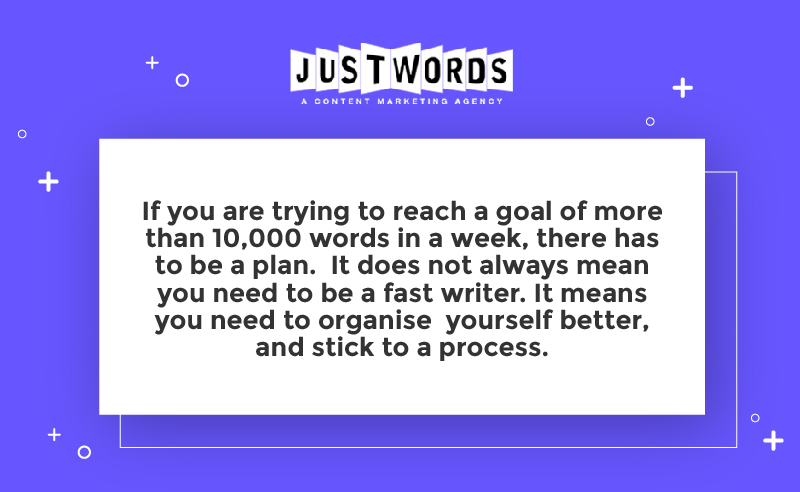I love writing. That’s what I do almost the whole day, every working day of the week and month and year. Well, you guessed it – I am a writer and I love being one. I usually write about 3000-4000 words a day, depending on what I am writing. If it’s heavy stuff like writing a blog that needs loads of research, I write about 2000-2500 a day. When it’s less heavy stuff, I can crank out more. So the point of this blog is to answer a question – how to write more than 10,000 words in a 5-day week?
From my experience of working with a content agency, I have seen interns starting with 500-1000 words a day. Some writers even struggle to reach 2000 in a day. The point is you don’t have to write 4000 words a day, but if you are trying to reach a goal of more than 10,000 words in a week, there has to be a plan. It does not always mean you need to be a fast writer. It means you need to organise yourself better, and stick to a process.
Writing isn’t the same as any other task. It requires considerable planning, research and writing. There is no magic pill or quick mantra that can make you churn out 5000 words a day or help you finish writing that book that you’ve been putting off for weeks. However, there are certain tips and techniques which can help you write more. Let’s explore more of that.
Be S.M.A.R.T About Setting Writing Goals
If you want to maximise your output as a writer, you have to be realistic about it. There are no benchmarks. The effort, the thinking and planning that goes into each piece is different. For instance writing 4 blogs posts of 500 word each is different from writing a long article of 3000 words. Keep this mind when you set targets for yourself.

S – Specific
Be specific about your goal. Do you mean to write 4 blog posts of 500 words each or a 2000-word-long product guide. The word count is the same but goals are different and will require a different approach.
M – Measurable
Create goals that you can measure. Don’t give yourself vague goals like “ Learning to write brilliantly” etc. Set goals that you can measure your performance against and check off as you progress each day. Say for instance, getting done with two chapters of the book each day or writing 2 blogs of 700 words each. You can then measure your performance at the end of the day or track your performance at the end of the week. And before you know it you’ll have completed a manuscript by the end of the month.
A – Achievable
Set goals that are attainable. Don’t set out to complete a book in one day because that isn’t possible.
R – Realistic
You should set realistic and relevant goals for yourself as a writer. This will help boost your productivity and mould you into a better writer with time.
T – Time bound
Set a time-frame for achieving your daily goal. Are you planning to get the tasks done in a day, two days or a week? This will help you stay inspired and motivated.
Take Notes
Keep a pen and paper handy at all times because great ideas or thoughts often strike at the most unexpected times- while driving, while taking a shower, while watching TV etc. Note it down. Not because it’s ready to read or it will complete your piece but simply because writing it down is the only way to give your ideas a tangible shape. Take down notes as and when they strike. Come back to it when you’re actually ready to write. Believe it or not, it will make your writings go a lot faster. These random scribbling go a long way into giving your ideas a concrete shape. It’s a lot easier than starting with a blank paper. You can’t build a house without the necessary materials. That’s what these writings are-materials to help you write building of a piece.
Focus on One Type of Writing
Ever been in the situation when you’re writing a comprehensive blog and suddenly you’re asked by your boss to come up with some tweets for a client’s Twitter handle?
Annoying but real.
Being a copywriter simply means everything writing-related falls in your plate. Writing long-form content requires concentration and unbroken rhythm.

You can’t accelerate when there is heavy traffic. If you want to know your speed limit, you need to drive on a clear lane. Similarly, in writing you need to focus on one style of writing at least initially until you have had some experience. Once you have picked up speed in a particular type of writing, you can accommodate other tasks as well.
Outline
This is the key to writing long-form content that makes sense to the reader. Give your blog, article or e-book a structure. Make this a part of the research process. Outline is what gives your thought a direction when you’re writing; else it becomes easy to lose track of the subject as you move along. Deciding on the outline takes time but saves a lot of time eventually when you actually sit down to write. Writing without an outline is like going grocery shopping without a list, you end up buying a lot of things you don’t need.
Read Other Good Writers
Finally, if you want to produce great work while at the same achieve your writing goals; you have to read some of the great works produced by other great writers. Reading will give you ideas and enhance your thought process. Spend time reading and your writing will gradually get better.
Love Writing
Lastly, there is simply no other way to get better and faster at writing than by loving what you do. You got to love the whole process of writing – thinking, researching, reading, thinking again and finally writing! No matter what you write, how good or bad you are at it, irrespective of the success you’ve had or the feedback you get, you have to love what you do to keep going.
Also Read: Best Content Writing Tips For Beginners
You have to love it so much that it doesn’t feel like a chore. You should be thinking about writing when you’re actually writing and also when you aren’t writing like at night when you’re relaxing, or when you’re catching up on favourite TV show. It should come naturally. You shouldn’t have to force it.
When it comes naturally it won’t stress you out either. In fact you will come up with some great thoughts and ideas. Most great writers admit that ideas strike most when they are not consciously thinking about. They may be involved in other household chore, driving, listening to music or simply relaxing. That’s because they are subconsciously thinking about writing even if they’re not actually working. That happens only when writing is your passion and not just your profession.
Last Word
Finally achieving your writing goal is a gradual process. Drown yourself in the process and you’ll learn to swim your way up. Start small, take baby steps. Be sincere in your efforts and you’ll soon realize you are getting way more done that when you first started out. You may need help from your colleagues or other team members but be persistent and you’ll get there eventually. The word count will stop being intimidating and every molehill will no longer be a mountain.






